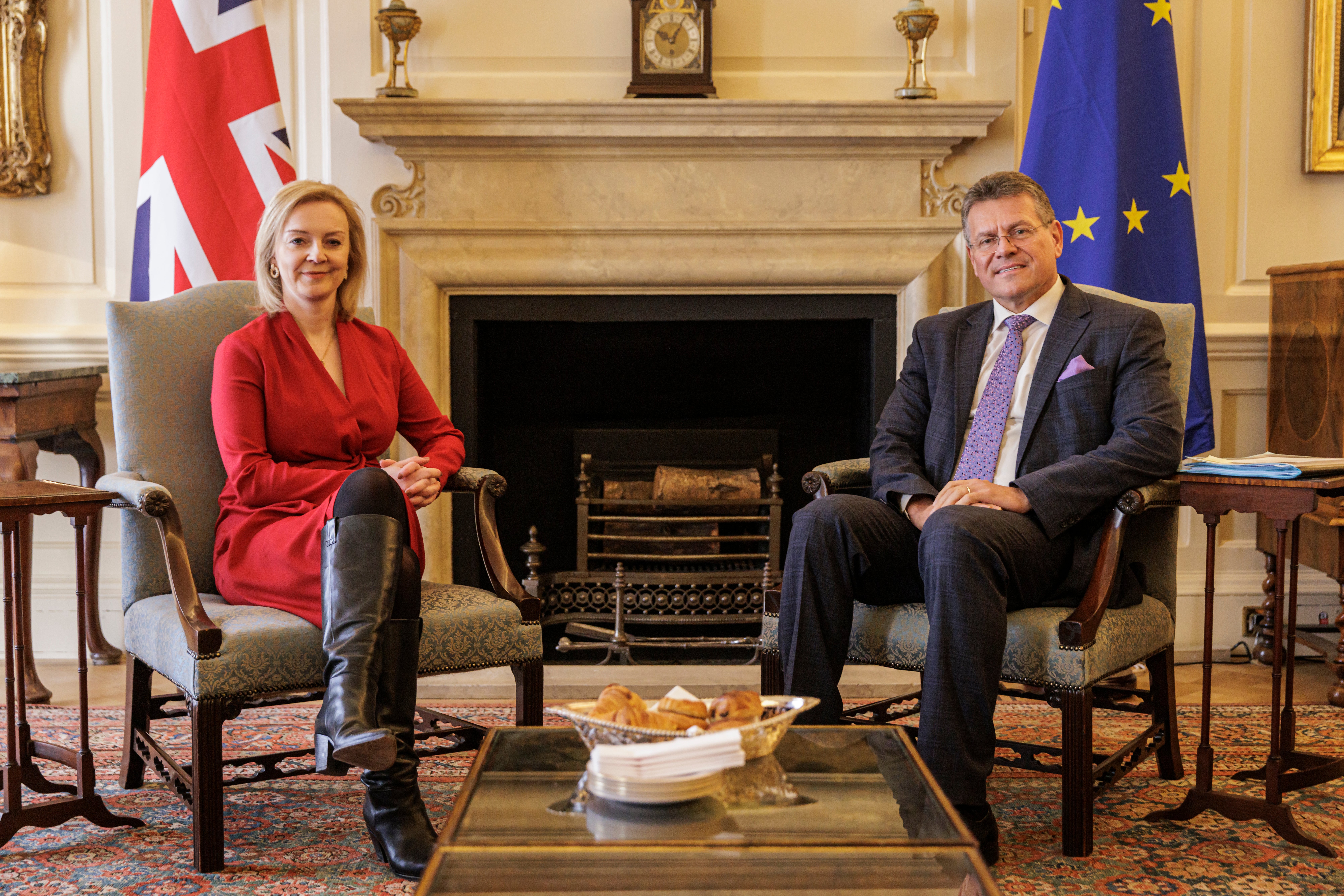Why Northern Ireland is the cornerstone of dispute between Boris Johnson and the EU
Liz Truss wants to blow up the Northern Ireland protocol, but the EU is not going to allow that to happen


The UK is on the brink of another major dispute with the EU, after Liz Truss abandoned her conciliatory approach in her negotiations on the Northern Ireland protocol, covering goods moving from Great Britain to the province.
The foreign secretary is now playing hardball. She wants, in effect, to blow up the agreement Boris Johnson signed in 2019. I’m told she regards accepting the trade border in the Irish Sea as a mistake. Johnson won’t admit that, of course. It’s always someone else’s fault, and in this case his favourite bogeyman – Brussels – fits the bill.
Truss has drawn up a draft bill to unilaterally suspend key elements of the protocol and hopes to unveil it next week. It is both a negotiating tactic aimed at winning more EU concessions – although officials admit the two sides are “on different planets” – and a means to prevent disruption to trade by having separate arrangements for goods going to Northern Ireland and Ireland respectively.
The government demands the EU gives Maros Sefcovic, the commission’s vice-president, “a new negotiating mandate” so he can make political rather than technical decisions. That is not going to happen. It’s a crass demand: imagine the reaction if EU leaders urged the cabinet to water down Truss’s mandate so she could hand sweeties to Brussels.
The proposed legislation is incendiary in EU eyes. It’s tougher than the previous idea of triggering Article 16, which is part of the protocol. EU diplomats told me today the UK threats will backfire: Brussels will be less likely to give ground if the UK tears up the agreement. Indeed, some EU leaders are already threatening a retaliatory trade war. But there are signs the EU will start infringement proceedings if the bill goes ahead and will retaliate if it becomes law. Measures such as tariffs would increase the pain of the cost of living and the risk of recession.
Whether UK ministers like it or not, the EU thinks it has already moved a long way to soften the protocol’s impact. It will not take kindly to seeing them rubbished. Truss’s claim that the EU blueprint would be even worse than the status quo is disingenuous; that is only because parts of Johnson’s agreement have been delayed by grace periods.
This crisis was always going to happen at some point. Typically, Johnson decided in 2019 to swallow an Irish Sea border to get a withdrawal agreement over the line and worry about the unpalatable details later. Why now? Ministers are trying to exploit the paralysis over Northern Ireland’s power-sharing government after last week’s elections. The Democratic Unionist Party, which came second behind Sinn Fein for the first time, is refusing to re-enter the executive until the protocol is rewritten.
UK ministers are using this as cover for their demands for a new agreement. Although all the unionists elected to the Northern Ireland assembly oppose the protocol, overall 53 of the 90 members support it.
Ministers conveniently ignore that as they warn the protocol endangers the 1998 Good Friday Agreement and accuse the EU of failing to grasp the threat to stability and peace. Yet that is not how the UK’s move will be seen around the world. Micheal Martin, the Irish prime minister, told Johnson in a phone call yesterday the UK would be destabilising the peace process. The United States, which is expected to appoint a special envoy to Northern Ireland soon, is very worried by Truss’s proposal. Two US congressmen have warned her in a letter the move would “be in direct violation of international law and squarely threaten the Good Friday agreement”.
Suella Braverman, the attorney general (and a former chair of the hardline Brexiteer European Research Group), is expected to rule that Truss’s bill would not breach international law because it is designed to protect an international agreement in the Good Friday one. That will not cut much ice in Washington, Dublin or Brussels.
To keep up to speed with all the latest opinions and comment, sign up to our free weekly Voices Dispatches newsletter by clicking here
Some UK ministers think Johnson, who is visiting Sweden and Finland today, can use the political credit he has deservedly built up in the Ukraine crisis to persuade the UK’s EU allies to press for more flexibility over the protocol. But he has repeatedly failed to “divide and rule” the 27-strong bloc and it will again remain solid now. Not surprisingly, all EU members think the UK should stick to the deal it signed.
The justified suspicion in Brussels is that Johnson is pandering to his party’s Eurosceptic right to boost his prospects of keeping his job. “We have seen this movie before,” one diplomat told me. “Boris is being Boris.” That is one reason why the EU will not escalate the dispute immediately, believing it would play into Johnson’s hands domestically. But it will retaliate if the bill becomes law and measures such as tariffs would increase the pain of the cost of living and the risk of recession.
No wonder Rishi Sunak and Michael Gove have doubts about the hardline approach of Truss who, with Johnson’s survival still in doubt, also has every incentive to play to the Tory gallery.
We can see where Johnson’s and Truss’s priorities lie. They are the two biggest cheerleaders for “Global Britain” but are about to tarnish its image around the world. Far from using his Ukraine credit, Johnson is about to squander it, and divide the forces against Vladimir Putin.
Join our commenting forum
Join thought-provoking conversations, follow other Independent readers and see their replies
Comments
Bookmark popover
Removed from bookmarks